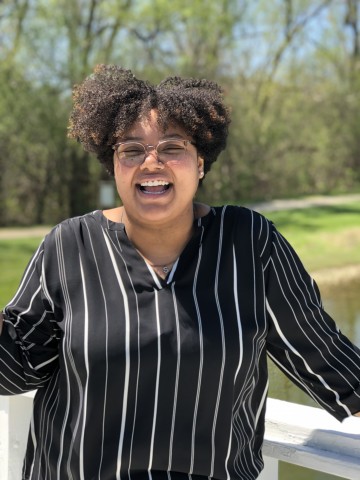
After George Floyd’s brutal killing, MSW Student Sidney Arrington wrote a community-wide email to protest the silence from the School of Social Work. In it, she called for School leadership to use their platform to speak out against racial injustice, for professors to recognize the trauma this puts on particularly BIPOC (Black, Indigenous and People of Color) students, and for the community to actively fight white supremacy in our society. Later that week, she co-wrote an op-ed in the Michigan Daily, which extended the same concerns to the deans and senior leadership of schools and units throughout the University of Michigan.
“The day after, the video [of Floyd’s death] was all over the internet. I still had work and school-related activities to do online, but I couldn’t go on any social media without seeing this,” she remembers. “In my field work, I’m the social media intern — being a social media intern right now is definitely a challenge.”
George Floyd was the latest in a long line of Black lives lost at the hands of law enforcement. While Arrington knew from her undergrad experience that the university rarely responded to these deaths, she had different expectations for the School of Social Work. “No one said anything,” she said. “This news is hard, especially as BIPOC students. We can’t unsee that video,” she says. “We are taught to check on our clients, but we weren’t doing that in house. We didn’t talk about it in class nor did the administration address the emotional trauma in the air. It made me uncomfortable to stay silent. I knew I needed to say something.”
Arrington saw the opportunity to put her social work training into practice in this very real world situation. The time spent sheltering at home from the coronavirus pandemic refined her perspective. “Every day, we are creating a new world with our priorities. I like using all three realms — micro, mezzo, macro — and pairing trauma-informed approaches with systems. We can’t solve the world without first addressing these issues in ourselves. We talk about self care: How do you give yourself grace when none of the systems around you are giving you grace? I saw us repeating the same cycle of not acknowledging issues. That drove me to speak out.”
Arrington’s email to the School resulted in a community-sourced list of resources and suggested actions to combat racism and police brutality immediately, and a commitment to empower every member of the School community to take a stand against the structures that perpetuate and tolerate racial injustice. The School has convened a group of students, faculty and staff to construct a clear and visible strategy to meet these goals and provide timely and sensitive responses.
“Organizing is essential and sparks change, but it’s exhausting,” says Arrington. Her email and editorial have led to a website — Fund Racial Justice — to keep the efforts going. “Students are onboard and people want to help, so it takes the pressure off and I’m grateful.”
At the School of Social Work, Arrington is studying Social Policy and Evaluation and Community and Social Systems. She became interested in public policy through high school programs, and as an undergrad at U-M’s College for Literature, Science, and the Arts, Arrington originally set her sights on attending either the Law or the Ford School before realizing that she’d rather work with people than write legislation. Minoring in Community Action and Social Change (CASC) at the School of Social Work provided a way to merge both policy and people. “My path has been filled with twists and turns,” she says. “This experience reminded me why I want to do this work, that I can do passionate, energizing work on the ground. And it made me realize we really have to change the system. It’s important to have these issues out there and address them. We can’t keep doing the same thing.”
She’s thankful that her message was heard and hopes it will be incorporated into changes at the School. “We are at a critical point to start incorporating and weaving in changes. This is going to take a bit of time, but I think this is the perfect opportunity if the School is willing to start taking steps in that direction.”